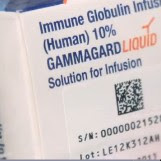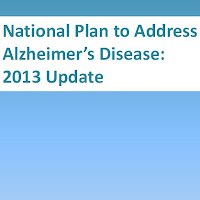
Solanezumab May Become The 1st Alzheimer’s-Modifying Treatment
Learn why neurologists wish they could prescribe experimental solanezumab to 15% of their Alzheimer’s patients. Solanezumab is Eli Lilly’s exciting, maturing attempt to create a

Learn why neurologists wish they could prescribe experimental solanezumab to 15% of their Alzheimer’s patients. Solanezumab is Eli Lilly’s exciting, maturing attempt to create a

VIDEO Last year, cancer got 10 times as many research dollars as Alzheimer’s. Many feel that investing that kind of money into curing Alzheimer’s will

In an important shift, nursing homes are using significantly fewer antipsychotics for dementia. Instead, they are pursuing more patient-centered treatments. Gain insights into the big

VIDEO Last year, cancer got 10 times as many research dollars as Alzheimer’s. Many feel that investing that kind of money into curing Alzheimer’s will

VIDEO + ARTICLE IVIG is an FDA-Approved medication. It has been prescribed off-label for Alzheimer’s. Despite recent failures in clinical trials, pharmaceutical companies and academic

Professional care for people with dementias such as Alzheimer’s is commonly referred to as “Long-Term Care”. 70% of people turning age 65 can expect to

VIDEOS & ARTICLE Watch videos on the newly released National Plan to Address Alzheimer’s Disease: 2013 Update. Read about the new timeline for achieving its first goal

A new experimental drug may rescue brain cells just as they begin to become impaired, stopping Alzheimer’s before it is even noticeable. Learn why researchers

Using Deep Brain Stimulation to treat Alzheimer’s is starting to take off. More patients are being added to clinical trials. Learn about the U.S. FDA’s

News on bexarotene demands explaining. In the Alzheimer’s lab, this FDA-approved anti-cancer drug improves memory. Since that is what matters to people, funding is pouring

A simple blood test was newly approved, replacing spinal taps and brain scans for ruling out Alzheimer’s. The FDA has just cleared Roche’s Elecsys® pTau181 — the first test shown to rule out Alzheimer’s with 98% accuracy, offering peace of mind and earlier answers for millions.

DESIGN: See this video packed with great examples of home design for dementia. These insights can make a world of difference.

Love grows by giving.The love we give is the only love we keep.

Plaques are the best-known Alzheimer’s culprit. Cambridge scientists have figured out the 7 steps to forming these plaques. Find out how targeting the formation of these “oligomers” may hold the key to a cure.

UCLA researchers found active people build 5% more gray matter in their brain. See how this prevents Alzheimer’s.

Learn about The Alzheimer’s Society of Canada’s campaign to bust the stigma of dementia.
Discover 6 easy ways you can make a difference.

Fresh air and exercise, improved appetite, fewer medications and happier family visits typify the world’s first “Dementia Village”. See how an inspired nursing home manager took a dreary hospital and turned it into a respect-filled, compassionate community.
No spam, only news and updates.


